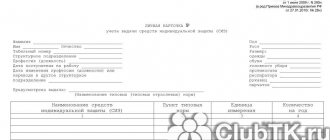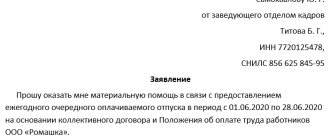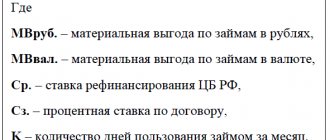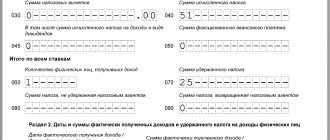2021
cashier
(collective)
seller
The employer entrusts the employee with the property of the enterprise, the employee is responsible for its safety. In most cases, financial liability for damage caused is limited to one salary. To fully recover damages, a number of conditions must be present: a basis under the Labor Code of the Russian Federation or the classification of the employee as a financially responsible person with the conclusion of an agreement. Each employee is responsible for the values entrusted to him; it is allowed to sign a general agreement with the team (represented by the foreman, but each member of the team signs) when it is not possible to delimit work areas. Therefore, when hiring, an agreement on financial responsibility for the safety of funds at the cash register is drawn up with the cashier, and when transferring goods to the store for sale - with a team of sellers.
ConsultantPlus experts looked at how to hold an employee to full financial responsibility. Use these instructions for free.
Liability agreement
Tyumen
December 28, 2023
Individual entrepreneur "Evgeniy Denisovich Kharitonov", acting on the basis of a certificate of registration as an individual entrepreneur number: 00000 dated 05/21/2020, passport: series 0000 number 000000, registered at the address: Tyumen region, Tyumen city, Yaroslavskaya street, house 567, building 3 , apartment 708, hereinafter referred to as the Employer, on the one hand, I Shukshaev Yaroslav Valentinovich, passport: series 0000 number 000000, living at the address: Tyumen region, Tyumen city, Novoselova street, building 789, building 2, apartment 807, hereinafter referred to as the Employee , on the other hand, have entered into this agreement as follows:
The preamble of the agreement, in our case, contains the following elements:
- type of agreement;
- names of the parties to the transaction;
- the roles of counterparties within the framework of the agreement;
- information about the employer’s registration as an individual entrepreneur;
- passport details of the parties.
For the contract to come into force, it must contain provisions on all essential terms. In the case of a liability agreement, these are:
- obligations of counterparties;
- responsibility of the parties and the procedure for determining damage.
So, below we will examine in detail how each of the above sections of the agreement is drawn up.
The procedure for applying limited liability
Damage caused to the employer, and not exceeding the average monthly earnings, can be recovered as follows (Article 248 of the Labor Code of the Russian Federation):
- By order of the employer, if one month has not passed since the amount of damage was established.
- Through legal proceedings, if the monthly period has expired, or the employee does not consent to the withholding, and the amount of damage exceeds his average monthly salary.
Recovery of damages from an employee is only the right of the employer, but not an obligation, therefore, taking into account all the circumstances, he may refuse to recover damages from the guilty employee or reduce its amount (Article 240 of the Labor Code of the Russian Federation).
Initial positions
This section defines the very essence of the contract. That is, it is necessary to indicate what types of work the Employee performs, as well as what property of the Employer he interacts with. Information about this allows you to determine the type of activity of the employee. This section is compiled as follows:
In accordance with the concluded agreement, the Employee carries out activities in the retail purchase and sale of tobacco and non-tobacco products related to the hookah industry. This agreement defines the Employee’s financial liability in the event of damage to goods and other property of the employer.
What is materiel responsibility
One of the types of legal liability of participants in labor relations is material. Its meaning lies in the obligation of one of the parties to the labor relationship to compensate the other party for the damage caused. It is borne only by employees working under an employment contract (this includes part-time, temporary and seasonal workers).
In order to correctly draw up a liability agreement, let’s look at the conditions under which it occurs:
- illegality of the employee’s actions (inactions);
- direct actual damage to the property of the employer or third parties and costs or excess payments for the acquisition, restoration of property or compensation for damage caused to third parties;
- cause-and-effect relationship between the person’s actions and the damage caused;
- guilt in the form of intent or negligence.
Duties of the parties
The section on the obligations of counterparties is a fundamental component of this agreement. This is due to the fact that it prescribes provisions on the employee’s activities, rules of behavior and ensuring the safety of property. The Employer's responsibilities are also stated in the text of the document. They are mainly related to what conditions he must provide to the Employee for the latter to carry out his activities.
So the section looks like this:
The Employer undertakes to: • Create normal conditions for the Employee’s activities. • Conduct consultation related to workplace rules of conduct. • Familiarize the Employee with safety rules. • Conduct training related to the employee's activities. • Familiarize the Employee with the provisions of the legislation of the Russian Federation related to financial liability. • Conduct an audit of the Employee’s work activity. • Carry out inventory, audit and other actions related to the safety of the Employer’s goods and other property. • Fulfill your obligations in strict accordance with the provisions of this agreement. The Employee undertakes: • To treat with caution and care the property of the Employer entrusted to him in accordance with the clauses of this agreement. • Ensure the safety of goods and other property of the Employer. • Comply with the rules of conduct in the workplace established by the Employer. • Observe safety precautions. • Inform the Employer about possible risks of damage to property. • Maintain reports on the implementation of your work activities.
When an employee cannot be found guilty
It is not always possible to force a subordinate to pay for damage: the law stipulates such specific situations. Blame cannot be placed on a subordinate if the employer himself has not provided conditions for the safety of his property. For example, a security guard cannot be forced to pay for stealing property if it was left outside the warehouse rather than in the warehouse.
Another circumstance that excludes the employee’s guilt is actions in conditions of extreme necessity or defense. Let's take the case of the same security guard. It is not he who will pay for the broken window, but the employer himself, if it is proven that the employee acted with the aim of catching the criminal.
Hurricanes, natural disasters and other force majeure situations are also on the side of subordinates. In such cases, demanding compensation from them is expressly prohibited by Art. 239 Labor Code of the Russian Federation.
Sample employment contract with financial responsibility
Responsibility of the parties and the procedure for determining damage
This section defines the essence of this agreement. Here are provisions related to the liability of Counterparties in the event of any circumstances that lead to adverse consequences. The mentioned section looks like this:
• The employee bears financial responsibility in case of damage to goods or other property entrusted to him by the Employer. • Damage is determined during the inspection of property and goods by the Employer. • Compensation for damage can be made by agreement of the parties, either in full or in part. • The employee is not liable for damage to the employer's property caused through no fault of his own. • Determination of damage is carried out in accordance with the requirements of current legislation. • The employer is responsible for non-fulfillment or improper fulfillment of his obligations under the contract.
With whom do they conclude agreements on full financial liability?
Three conditions must be met:
— The person is 18 years old;
— He works directly with money and goods. Directly means he takes money in his hands, stands behind the counter with goods, or delivers orders.
— The position or work performed is listed in Resolution of the Ministry of Labor of the Russian Federation dated December 31, 2002 No. 85. Therefore, it is important to correctly name the position in the staffing table and employment contract.
Popular positions from the list:
- cashier;
- administrator in trade, catering, hotels;
- salesman;
- merchandiser;
- master of construction and installation works;
- Warehouse Manager;
- storekeeper;
- forwarder.
Popular works:
- accepting payments;
- release of goods and services;
- release of material assets from the warehouse;
- cargo delivery.
If there is no suitable position or work in the list, full responsibility cannot be registered. For example, the Ministry of Labor does not mention security guards. The agreement with them has no legal force.
The director and chief accountant are not on the list, but they also bear full responsibility. You just need to include a clause in the employment contract - Art. 243 Labor Code of the Russian Federation.
If the employee is against the contract
People don't like to take unnecessary risks. But employees are required to sign an agreement on full financial responsibility if they primarily work with money or goods, and the position is included in the list of the Ministry of Labor. For rioting, you can be reprimanded and even fired, which was allowed by the Plenum of the Armed Forces of the Russian Federation in paragraph 36 of Resolution No. 2 of March 17, 2004.
Article about employee responsibility
Rules for imposing financial liability on an employee
The employee is subject to a presumption of innocence - the employer must prove the fact of causing damage. Thus, he must prove that direct damage occurred as a result of illegal actions or inaction of the employee (he did not fulfill his duties, and because of this property was damaged), and identify the causal relationship between the employee’s actions and the damage caused. All this can be revealed by an inspection initiated by the employer upon the fact of a violation - in the conclusion drawn up based on the results of its work, individual facts should form a complete picture proving the employee’s guilt.
The damage itself must be recorded in the inventory during the inspection, on the basis of which a report will then be drawn up. Its size is determined by the losses incurred. They are calculated taking into account market prices (currently in a given area) and the degree of depreciation of the property.
How to recover damages
Damage may be recovered by the administration (no more than 20% will be deducted from the employee’s salary each month). It is important here that such an order was given no later than a month from the moment the amount of damage was established. Such a penalty is possible if the employee does not object to it.
You can also recover damages through court. This is usually resorted to if the administration did not manage to issue an order within a month (however, no more than a year has passed since the offense), the amount of payments is greater than the average monthly earnings of the employee, he himself expressed his disagreement with such actions (the very fact of the penalty or its size) or resigned From the job.
Samples of a liability agreement:
limited
full individual
In what cases does financial liability arise?
Employee's responsibility
It arises only if the employee’s guilt is proven. Damage means deterioration (decrease) or complete loss of valuable property. If force majeure or self-defense occurred, the employee cannot be punished. Damage will not be recovered if there was a so-called production and economic risk (for example, new technical equipment was tested and some of them were damaged).
Material on the topic Concluding a liability agreement with the chief accountant Employer’s liability
The employer is obliged to create conditions for normal work, ensure labor safety and preservation of employees’ property while they perform their duties. Financial liability arises if the property of employees is damaged, as well as if the employer violates the employee’s right to fulfill his duties: does not pay him wages on time, or somehow causes him moral suffering.






